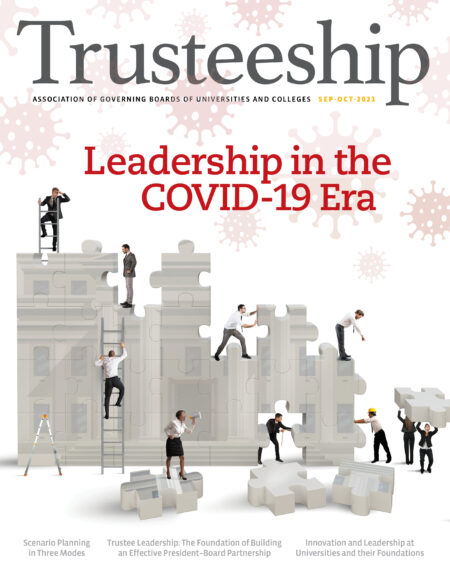
Why is equity in student success a priority for higher education?
Joseph I. Castro serves as the eighth chancellor to lead the California State University (CSU). He is the first Californian and first person of color to serve in this role. He earned a bachelor’s degree in political science and a master’s in public policy from the University of California, Berkeley and a PhD in higher education policy and leadership from Stanford University. Prior to his appointment as CSU chancellor in September 2020, Castro served as the president of California State University, Fresno, beginning in 2013.
How have you made equity in student success outcomes a priority in your career?
As the son of a single mom and the grandson of a Dreamer from Mexico, I was the first in my family to go to college, attending UC Berkeley as part of a program that recruited students from California’s Central Valley and from modest financial means. One of my earliest college memories was being the only Latino in the classroom. I distinctly remember my classmates reviewing the required reading and excitedly remarking, “I’ve already read that book. That one, too.” I didn’t recognize a single title.
Fortunately, I had academic support and invaluable mentors who helped me quickly make up lost ground. As I began to see my own life transformed, I developed a passion for educational leadership and an overarching priority that remains to this day: to advance student success and educational equity in all its dimensions.
Our current moment in time implores us to redouble our efforts to achieve equity, with a new level of accountability throughout our institutions. It will require that every stakeholder, every student touchpoint—from faculty to advisors to administrators to campus leaders—take daily, mindful, personal responsibility for proactively seeking out and removing barriers for our most vulnerable students. Success requires bold action, and nothing is off the table.
How is Cal State prioritizing equity and student success? How does the CSUCCESS program contribute to this?
Our flagship student-success effort, Graduation Initiative 2025, aims to improve graduation rates and eliminate equity gaps between students of color, low-income students and first-generation students, and their peers. It’s focused on better course access; fewer administrative barriers; a greater emphasis on student basic needs, advising and engagement; diversifying faculty and staff; and sharing data to more effectively to target student support. There’s still work to do, but student success measures are at all-time highs, for students from all backgrounds.
We are also expanding upon the virtual instruction and support strategies that have proven effective during the pandemic, using them to enrich the CSU student experience moving forward. Of course, virtual offerings can exacerbate equity issues if we don’t take meaningful steps to bridge the digital divide. And thanks to our new CSUCCESS initiative, every incoming first-year or transfer student at campuses participating in its initial phase (potentially 35,000 students) will be given a new iPad Air, Apple Pencil, and Apple Smart Keyboard Folio, which will be theirs to use for the entirety of their CSU undergraduate college experience, enabling them to take full advantage of vital online programs and resources. I am confident that it will be a game-changer for our most vulnerable students.
Why is equity in student success vital to higher education as a whole?
As the nation’s largest and most diverse four-year public university, it is the CSU’s highest mission to afford students of all backgrounds, incomes, and circumstances the opportunity to earn the security, prosperity, and purpose that come with a CSU degree.
Beyond elevating graduates’ lives, higher education brings lasting benefits to all of us. Degree holders are much more likely to donate to charity, volunteer, and serve as community leaders. The higher the education level, the higher the voting rate. And college graduates are far more willing to engage with legislators, run for office, and attend civic meetings, helping to shape our democracy. We must ensure that all students have access to these opportunities.
But I want to leave you with the words of one of our graduates. A child of immigrants raised in South Los Angeles, Luis Dominguez was always fascinated by space. But it wasn’t until he was a student at Cal Poly Pomona that he discovered NASA’s Jet Propulsion Laboratory, just up the freeway from his home. Today, Luis works on JPL’s Mars rover team, but takes his role of inspiring future generations just as seriously. His reason? “Genius… is… everywhere.”

